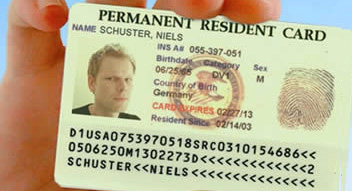Green Card Frequently Asked Questions
Q: What is an immigrant visa?
A: An immigrant visa represents permission to enter the U.S. for an indefinite period. People wanting to move permanently to the United States seek this type of visa. An immigrant visa can be based on employment, family relationship, business investment, or other ties to the U.S.
Q: What is the difference between an immigrant visa and a nonimmigrant visa?
A: Generally, recipients of immigrant visas have permission to stay in the U.S. for as long as they would like. A nonimmigrant visa is usually for temporary visitors to the United States who may be here to travel, seek medical attention, conduct business, or study. Usually, people in the United States on a nonimmigrant visa are not allowed to work here.
Q: What documents do I need in order to apply for an immigrant visa?
A: You will generally need a passport; three photographs; a birth certificate; marriage, divorce, or death certificates; and proof of financial support. You will also need to pass a medical examination.
Q: What is a “green card?”
A: A “green card” allows the holder to live and work in the United States, usually indefinitely. People seeking permanent immigration to the United States (and a green card) are usually sponsored by an employer or a family member. However, green cards can be obtained through the Diversity Lottery, through the asylum process, and via other means.
Q: What is required in order to enter the United States to marry a U.S. citizen?
A: The U.S. citizen must file a fiancé(e) petition with United States Citizenship and Immigration Services (USCIS). The USCIS will forward an approved petition to a U.S. embassy or consulate near you. You will be scheduled for an interview and if successful, you can enter the U.S. to marry the U.S. citizen. There is a short time limit for you to travel and wed after the visa is granted. After the marriage occurs, your U.S. spouse must contact USCIS to change your status to permanent resident. This status will be conditional on your marriage lasting for a set period and/or your showing the genuineness of the marriage.
Q: How long can a person remain outside of the United States without losing immigrant status?
A: Generally, a lawful permanent immigrant must make arrangements for reentry into the United States if he or she will be outside of the country for more than one year. These arrangements should be made prior to leaving the United States.
Q: Why aren’t natives of all countries eligible for the Diversity Lottery?
A: Diversity visas are meant to provide immigration opportunities to people from countries other than those that already send large number of immigrants to the United States. The list of countries included in the Diversity Lottery is updated every five years, based upon employment and family-based immigration statistics.
Q: When does a person need to hire an immigration attorney?
A: Most employers that sponsor foreign nationals for employment-based immigration have their own attorneys who will handle the immigration proceedings. Unless an employer is handling immigration matters for a potential employee, it is essential that an individual seeking permanent residency in the United States hire an immigration lawyer who keeps up on the United States’ rapidly changing immigration laws. In just the past few years, the Immigration and Naturalization Service (INS) was disassembled and its functions moved to other departments. Immigration now involves proceedings before the United States Department of Homeland Security, including the U.S. Citizenship and Immigration Services bureau. Procedures have also been updated, and standards heightened. An experienced immigration attorney knows how to deal with these changes, as well as with immigration judges, the Board of Immigration Appeals, the United States Department of Labor, the Board of Alien Labor Certification Appeals, and United States embassies and consulates worldwide. Many potential immigrants have had petitions rejected because of technicalities and failure to understand the complexities of U. S. immigration law. An immigration attorney can help avoid those problems.


